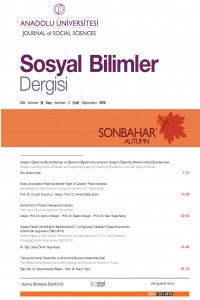Öz
Economic stability, political stability, market structure, market size, trade openness, and various regulations related to tax advantages have crucial importance to attract foreign direct investments (FDI) to an economy. In addition to the factor aforementioned, One of the other potential determinants for foreign direct investments (FDI) inflow might be the degree of unionization tendency in a particular host country. As unionization causes increase in the wages and brings some fringe benefits to labors which are extra financial burdens for employers, the profit of an enterprise reduces. Owing to this fact, willingness to invest of entrepreneurs diminishes and right after they may redirect their investment to abroad. Therefore, unionization rate may discourage investors and speed up the capital flight. This study investigates the association between unionization rate and capital outflow by using panel data. Our prior expectation is a positive relationship between unionization rate and capital flight. The findings obtained in the literature show that unions, always act in the favor of protective policies, resisted against policies which support both free trade and FDI.
Anahtar Kelimeler
Kaynakça
- Bellak, C. M. Leibrecht & Rield, A. (2008). Labour Costs and FDI Flows into Central and Eastern European Countries: A Survey of the Literature and Empirical Evidence. Structural Change and Economic Dynamics, 19(1), 17-37.
- Brandl, B., S. Strohmer and Traxler, F. (2010). US foreign direct investment, macro markets and labour relations: the case of enlarged Europe. Industrial Relations Journal, 41(6), 622-638.
- Cooke, W. N. (1997). The Influence of Industrial Relations Factors on U.S. Foreign Direct Investment Abroad. Industrial and Labor Relations Review, 51(1), 3-17.
- Cooke, W. N. (2003). The Influence of Industrial Relations System Factors on Foreign Direct Investment. In: Cooke W (ed.) Multinational Companies and Global Human Resource Strategies. Westport: Quorum Books, 65-86.
- Cooke, W. N. & Noble, D. S. (1998). Industrial Relations Systems and US Foreign Direct Investment Abroad. British Journal of Industrial Relations, 36, 581-609.
- Gross, D. M. & Ryan, M. J. (2008). FDI location and size: Does employment protection legislation matter? Regional Science and Urban Economics, 38(6), 590–605.
- Ishida, J. & Matsushima, N. (2005). Outward Foreign Direct Investment in Unionized Oligopoly: Some Welfare Implications. Discussion Paper, 2005-39, Graduate School of Business Administration, Kobe University.
- Kinkel, S. and Zanker, C. (2007),.Globale Produktionsstrategien in der Automobilzulieferindustrie. Berlin: Springer.
- Krzywdzinski, M. (2014). Do Investors Avoid Strong Trade Unions and Labour Regulation? Social Dumping in the European Automotive and Chemical Industries. Work, Employment & Society: A Journal of the British Sociological Association, 28(6), 926–945.
- Leahy, D. & Montagna, C. (2005). Union Legislation and Export Platform FDI. The Journal of International Trade & Economic Development, 14(4), 437–452.
- Lommerud, K. E., Meland, F. and Straume, O.R. (2005). Can Deunionization Lead to International Outsourcing? Cesifo Working Paper No. 1545, 1-28.
- Mukherjee, A. & Suetrong, K. (2007). Unionisation Structure and Strategic Foreign Direct Investment. Research Paper Series, Globalisation and Labour Markets, Research Paper No: 2007/22, 1-27.
- Naylor, R. & Santoni, M. (2003). Foreign Direct Investment and Wage Bargaining. J. Int. Trade & Economic Development, 12(1), 1–18.
- Radulescu, R. & Robson, M. (2008). Trade Unions, Wage Bargaining Coordination and Foreign Direct Investment. Labour, 22(4), 661-678.
- Skaksen, M. Y. & Sørensen, J. R. (2001). Should Trade Union Appreciate Foreign Direct Investment. Journal of International Economics, 55, 379 – 90.
- UNCTAD, (2009). Global FDI Flows Halved in 1st Quarter of 2009, UNCTAD Data Show; Prospects Remain Low For Rest of Year. Geneva: UNCTAD, (Press Release), Retriewed July 12, 2016, from http://unctad.org/en/Pages/PressReleaseArchive.aspx?ReferenceDocId=11666
- UNCTAD, (2016). Foreign Direct Investment (FDI) Net Inflows and Net Outflows as Share of GDP, UNCTAD, Retriewed March 22, 2016, from http://www.un.org/esa/sustdev/natlinfo/indicators/methodology_sheets/global_econ_partnership/fdi.pdf
Ayrıntılar
| Birincil Dil | İngilizce |
|---|---|
| Bölüm | Makaleler |
| Yazarlar | |
| Yayımlanma Tarihi | 25 Eylül 2018 |
| Gönderilme Tarihi | 26 Mayıs 2017 |
| Yayımlandığı Sayı | Yıl 2018 Cilt: 18 Sayı: 3 |
Bu eser Creative Commons Atıf-GayriTicari 4.0 Uluslararası Lisansı ile lisanslanmıştır.


